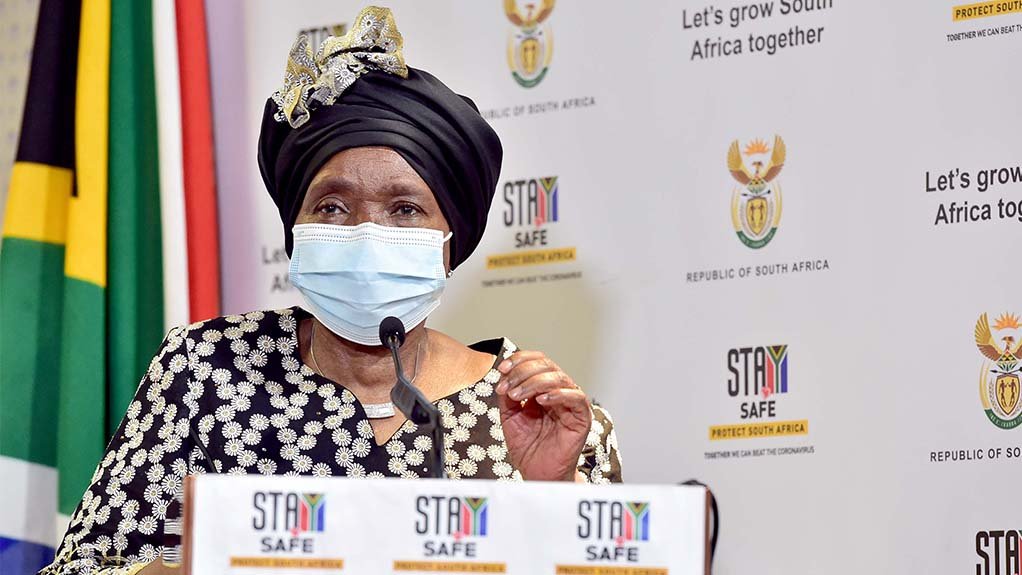It is not possible for government to have a different disaster management dispensation for faith-based organisations, especially in the third wave of Covid-19 infections, Cooperative Governance and Traditional Affairs Minister Nkosazana Dlamini-Zuma has said.
On Tuesday, several religious leaders complained to the Portfolio Committee on Cooperative Governance and Traditional Affairs about government's Covid-19 lockdown regulations. Some claimed the religious sector had been singled out.
On Thursday evening, Dlamini-Zuma responded.
She said the Disaster Management Act stated that the national executive was primarily responsible for managing the natural disaster, irrespective of whether a national disaster had been declared. She said the decisions were not necessarily taken by the Department of Cooperative Governance and Traditional Affairs (Cogta).
Cogta was only implementing Cabinet decisions. Furthermore, provinces, the South African Local Government Association (Salga) and traditional leaders would also have been consulted.
"The decisions that are taken are taken with regard to real scientific data, reduction in infections, or increase in infections, views expressed by relevant Cabinet ministers, views expressed by the advisory committee that advises the minister of health. So, all those things are taken into account," Dlamini-Zuma said.
"And we have seen that when the numbers are up, we cannot allow business as usual. When the numbers are down, the Cabinet has always tried to respond by allowing activities that would not be allowed when the numbers are too high."
She said Cabinet was also very aware and appreciative of faith-based organisations, that have cooperated well with government.
She said last year Easter and Eid couldn't be celebrated as usual. But this year, Cabinet increased the number of people who could attend gatherings during the Easter period as the number of infections wasn't too high.
She said it would not be possible for government to have a different dispensation for faith-based organisations, especially with the current number of infections.
"It would not be possible to say a faith-based organisation can go on as normal while others cannot go on as normal. It's not targeting faith-based organisations," Dlamini-Zuma added.
She used Youth Day, which is "normally celebrated in a big way", as an example, and said it had to be scaled down.
"It's not about targeting any particular group, particularly faith-based organisations. It's about saving lives."
She said President Cyril Ramaphosa had consulted faith-based organisations on several occasions.
During Tuesday's meeting, some religious leaders wanted "scientific proof" that religious gatherings were super-spreader events.
In a presentation, Ané Bruwer, the National Disaster Management Centre chief director for legislation and policy development, explained that the underlying rationale for the restrictions was "quite simply to prohibit gatherings of people until such time that infection rates are lower, the burden on the health system is lessened, and it is safe for the NCCC (National Coronavirus Command Council) to consider a change to the alert level or an easing of restrictions".
"Faith-based gatherings are difficult to regulate. Not only are congregants in close proximity to one another, but they act in community and share food and other things," read the presentation.
"While these acts of kindness and community are, in the ordinary course, to be lauded and promoted, the reality of the pandemic is they pose an enormous, even life-threatening risk, to congregants."
According to Cogta, there was an "unacceptably high risk that faith-based gatherings could turn into super-spreader events".
It used a big religious gathering in March 2020 in the Free State as an example.
"Religious gatherings are synonymous with singing, clapping hands, close proximity and hugging. This is all extremely risky behaviour that can easily lead to the spread of the virus," read the presentation.
Bruwer referred to an article in the Journal of Travel Medicine , which detailed how a single mass gathering resulted in the massive transmission of Covid-19 infections in Malaysia. Bruwer also mentioned an article by the US Centres for Disease Control and Prevention which documented that 122 choir members of a church became ill after attending choir practice for two and a half hours.
Dlamini-Zuma's remarks and the department's briefing did little to appease some of the religious leaders who attended the meeting. They remained sceptical that religious gatherings were super-spreader events when Covid-19 protocols were being observed. Several also pointed out that the event in the Free State took place before the lockdown or Covid-19 protocols were in place.
ACDP MP Steve Swart also took issue with government's continued use of the Free State event as an example.
"I was there. It was before the lockdown. Government keeps using it and it must be stopped!"
On occasion, committee chairperson Faith Muthambi had to remind the religious leaders that parliamentary decorum had to be maintained, including on the virtual platform's chatroom.
EMAIL THIS ARTICLE SAVE THIS ARTICLE
To subscribe email subscriptions@creamermedia.co.za or click here
To advertise email advertising@creamermedia.co.za or click here











